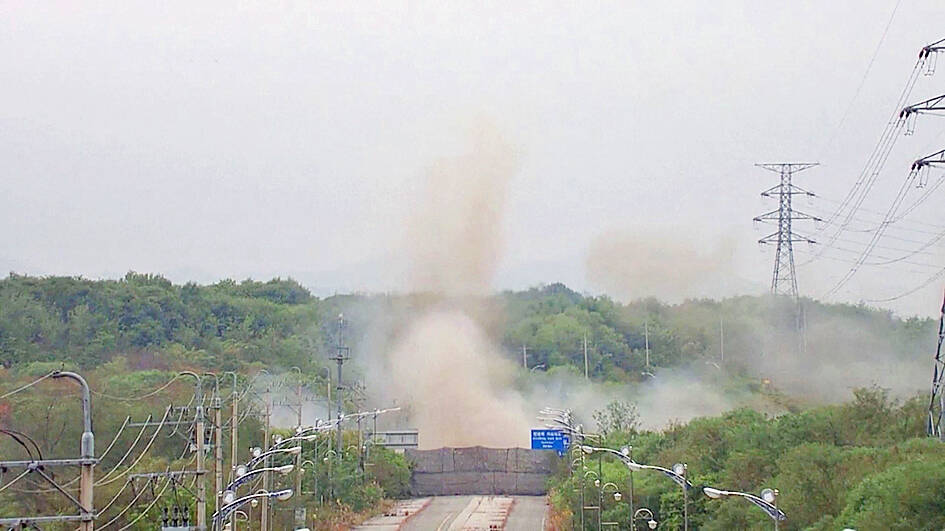North Korea is dismantling a facility at its Mount Kumgang resort used for hosting meetings between families separated after the Korean War, South Korea said yesterday, in the latest sign of strained tensions between the two Koreas.
The South Korean Ministry of Unification, which handles affairs between the nations, urged Pyongyang to immediately stop the action at the site near the border on the North’s east coast.
The 12-story building was built in 2008 with a budget of 55 billion won (US$37.86 million) funded by South Korea and includes an event hall and more than 200 guest rooms, the ministry said.

Photo: Reuters
The last tearful meeting between separated families was held at the venue in August 2018 before North Korea threatened to dismantle the resort the following year.
More than 130,000 South Koreans had registered to reunite with their separated families in the North as of December last year, with only 36,941 people still alive, government data showed.
The demolition of the facility is an “anti-humanitarian act that tramples on the wishes of separated families,” the ministry said, adding that it would consider legal measures over the action and a joint response with the international community.
The Mount Kumgang resort, located just beyond the demilitarized zone separating the two countries, was one of two major inter-Korean economic projects, along with the Kaesong industrial zone, seen as a symbol of rapprochement during decades of hostilities following the Korean War from 1950 to 1953.
North Korea blew up a joint liaison office in Kaesong in 2020 after complaining about defectors sending propaganda leaflets into the reclusive North.
North Korea has been escalating its rhetoric against its southern neighbour in recent years, designating South Korea as a “hostile state.”
Pyongyang also blew up sections of inter-Korean roads and rail lines on its side of the heavily fortified border last year, which prompted South Korea’s military to fire warning shots at the time.
Pyongyang in 2023 also scrapped a 2018 military accord designed to curb the risk of inadvertent clashes between two countries that remain technically at war, prompting the South to take a similar step.
Nonetheless, there have been signs that North Korea might be prepared to reopen to some foreign visitors for the first time in more than five years since the closure of its borders to tourism due to the COVID-19 pandemic.
Beijing-based Koryo Tours yesterday said tours to North Korea were “officially back,” with some of its staff allowed to enter the Rason area.

INVESTIGATION: The case is the latest instance of a DPP figure being implicated in an espionage network accused of allegedly leaking information to Chinese intelligence Democratic Progressive Party (DPP) member Ho Jen-chieh (何仁傑) was detained and held incommunicado yesterday on suspicion of spying for China during his tenure as assistant to then-minister of foreign affairs Joseph Wu (吳釗燮). The Taipei District Prosecutors’ Office said Ho was implicated during its investigation into alleged spying activities by former Presidential Office consultant Wu Shang-yu (吳尚雨). Prosecutors said there is reason to believe Ho breached the National Security Act (國家安全法) by leaking classified Ministry of Foreign Affairs information to Chinese intelligence. Following interrogation, prosecutors petitioned the Taipei District Court to detain Ho, citing concerns over potential collusion or tampering of evidence. The

Seventy percent of middle and elementary schools now conduct English classes entirely in English, the Ministry of Education said, as it encourages schools nationwide to adopt this practice Minister of Education (MOE) Cheng Ying-yao (鄭英耀) is scheduled to present a report on the government’s bilingual education policy to the Legislative Yuan’s Education and Culture Committee today. The report would outline strategies aimed at expanding access to education, reducing regional disparities and improving talent cultivation. Implementation of bilingual education policies has varied across local governments, occasionally drawing public criticism. For example, some schools have required teachers of non-English subjects to pass English proficiency

‘FORM OF PROTEST’: The German Institute Taipei said it was ‘shocked’ to see Nazi symbolism used in connection with political aims as it condemned the incident Sung Chien-liang (宋建樑), who led efforts to recall Democratic Progressive Party (DPP) Legislator Lee Kun-cheng (李坤城), was released on bail of NT$80,000 yesterday amid an outcry over a Nazi armband he wore to questioning the night before. Sung arrived at the New Taipei City District Prosecutors’ Office for questioning in a recall petition forgery case on Tuesday night wearing a red armband bearing a swastika, carrying a copy of Adolf Hitler’s Mein Kampf and giving a Nazi salute. Sung left the building at 1:15am without the armband and apparently covering the book with a coat. This is a serious international scandal and Chinese

TRADE: The premier pledged safeguards on ‘Made in Taiwan’ labeling, anti-dumping measures and stricter export controls to strengthen its position in trade talks Products labeled “made in Taiwan” must be genuinely made in Taiwan, Premier Cho Jung-tai (卓榮泰) said yesterday, vowing to enforce strict safeguards against “origin laundering” and initiate anti-dumping investigations to prevent China dumping its products in Taiwan. Cho made the remarks in a discussion session with representatives from industries in Kaohsiung. In response to the US government’s recent announcement of “reciprocal” tariffs on its trading partners, President William Lai (賴清德) and Cho last week began a series of consultations with industry leaders nationwide to gather feedback and address concerns. Taiwanese and US officials held a videoconference on Friday evening to discuss the